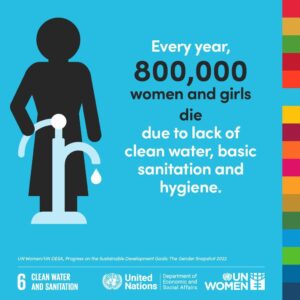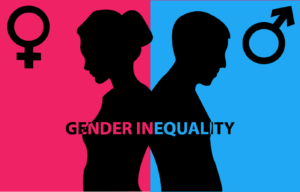
By Racheal Ogundipe
The “Water for life: Achieving gender equality in a context of the water crisis” UN Water Conference side event on Friday, 24 March 2023, covered the gender-water nexus. Representatives from United Nations Children’s Fund (UNICEF), United Nations Environment Program (UNEP) and Niger & Netherlands government were there. Accelerating gender inequality and access to water was broadly discussed.

Present speakers at the event were: Ginette Azcona, Research and data quality specialist at United Nations Women; Antra Bhatt, Statistics Specialist with United Nations Women Research and Data Team; Lauren Pandolfelli, Gender Statistics Specialist in the division of Data Research and policy at UNICEF; Rene van Hell, Director of Inclusive Green Growth at Dutch Ministry of Foreign Affairs; Maija Bertule, Senior Technical Advisor at United Nations Environment Programme – Danish Hydraulic Institute (UNEP-DHI) Centre; and Labo Madougou, Director of Development and Extension of Sanitation Services from the Water and Sanitation Ministry of Niger.
In the presentation by Ginette Azcona, from the UN spotlight paper which will be made available next month, she highlighted that, on 28 July 2010, through Resolution 64/292, the United Nations General Assembly explicitly recognized the human right to water and sanitation and acknowledged that clean drinking water and sanitation are essential to the realization of all human rights.
 She also mentioned that the 2015 United Nations resolution on the rights to water and sanitation called on States to “Promote both women’s leadership and their full, effective and equal participation in decision-making on water and sanitation management” ..and ensure that a “gender-based approach is adopted in relation to water and sanitation programmes.”
She also mentioned that the 2015 United Nations resolution on the rights to water and sanitation called on States to “Promote both women’s leadership and their full, effective and equal participation in decision-making on water and sanitation management” ..and ensure that a “gender-based approach is adopted in relation to water and sanitation programmes.”
An unequal burden: Costs and consequences of the global water crisis for women and girls
- More time poverty – When safe drinking water is unavailable on-premises, the burden of water collection and treatment largely falls on women and girls. In Malawi, women without safe drinking water in their households spend an average of 54 minutes a day collecting water, while men spend 6 minutes.
- Income poverty and food insecurity – the water crisis puts women’s livelihoods at risk, ultimately threatening their food security. In Niger, for example, where agriculture accounted for over a third of GDP in 2021, and nearly 7 in 10 employed women worked in agriculture (68.9 per cent), weather-related shocks greatly affect women’s income and income food security.
- Ill health – Every year, an estimated 660,000 women die prematurely to unsafe water sources compared to 570,000 men. Every year, 44 million pregnant women are infected with hookworm, which causes maternal anaemia and pre-term births.
- Greater exposure to violence – In addition to a higher incidence of domestic violence, water scarcity exacerbates intrastate conflict, which also impacts women and girls.
“To accelerate SDG6 (Ensure availability and sustainable management of water and sanitation for all),
we must accelerate SDG5 (Achieve gender equality and empower all women and girls)”
– Ginette Azcona
Way forward towards achieving gender equality and sustainable water and sanitation for all
Among other recommendations, the most striking recommendation in tackling gender inequality and other forms of discrimination which exacerbate inequality in accessing safe drinking water and safely managed sanitation services to promoting women’s equal leadership in water governance and management includes;
- Call for more investments in gender data to inform water and sanitation policy.
In 2020, nearly 6 in 10 countries had data on access to safe drinking water services at the national level (59.1 per cent); a smaller share had such data available for rural (32.6 per cent) and urban residents (42.0 per cent). Data on groups and sub-groups of women and girls furthest behind are also needed.
- Integrate women’s perspectives in the broader public discourse, as well as design and planning of programmes and policy implementation
Across all continents, women activists play key roles in responding to the global water crisis and managing its fallout. For these women and their communities, the fight for social justice (including gender equality) and environmental justice go hand in hand with the struggle for water rights and protection.
Leave a Reply